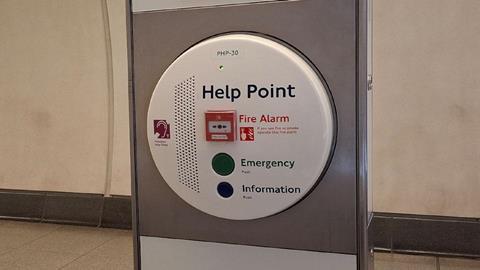
UK: Station operators need to improve the management of passenger help points to address poor reliability, according the Office of Rail & Road.
The regulator said 83% of stations on the national network have help points enabling passengers to speak to a member of staff. An equivalent service can also be accessed by calling a freephone number at 325 unstaffed or partially staffed stations without a help point.
ORR reviewed data from 21 station operators responsible for 4 500 help points at more than 2 100 of the 2 591 stations across the network. It also assessed Department for Transport and Transport Scotland data from service quality audits.
It found:
- a quarter of stations audited for DfT in England between April 2023 and August 2024 had at least one help point reported as not working when inspected;
- approaches to testing help points vary significantly, and may not identify and fixing issues promptly;
- there is a risk that help point and freephone services are impacted by poor mobile coverage in remote areas;
- not all operators collect and use data from help point calls, and so they are not able to assure the quality of their service or understand the needs of passengers using help points.
ORR has asked station operators to review their approaches to monitoring the availability of help points. They should also carry out a risk assessment for the unstaffed and partially-staffed stations that rely on mobile phone coverage for help point or freephone communication connectivity.
In early 2025 the regulator will seek to understand the actions being taken by station operators to address these areas.
‘Without regular inspection, maintenance, and an understanding of the purpose and frequency of usage, help points will not meet passenger expectations or support train and station operators in driving broader customer service improvement’, said ORR’s director of Strategy, Policy and & Reform Stephanie Tobyn on November 7.
Help point usage
ORR found that help point usage is relatively low: for the station operators that were able to report data, on average a call was made less than once a day at each station that had one or more help points. Passengers primarily used help points to access passenger information, such as finding out when the next train is (49% of calls), and they were also occasionally used to request passenger assistance (0·3%) or report an emergency (0·4%). Most of these calls were answered within 30 sec.
ORR said help points are not a primary route through which most passengers would choose to access the information or assistance they need, but they are an important back-up when other options are not available.



